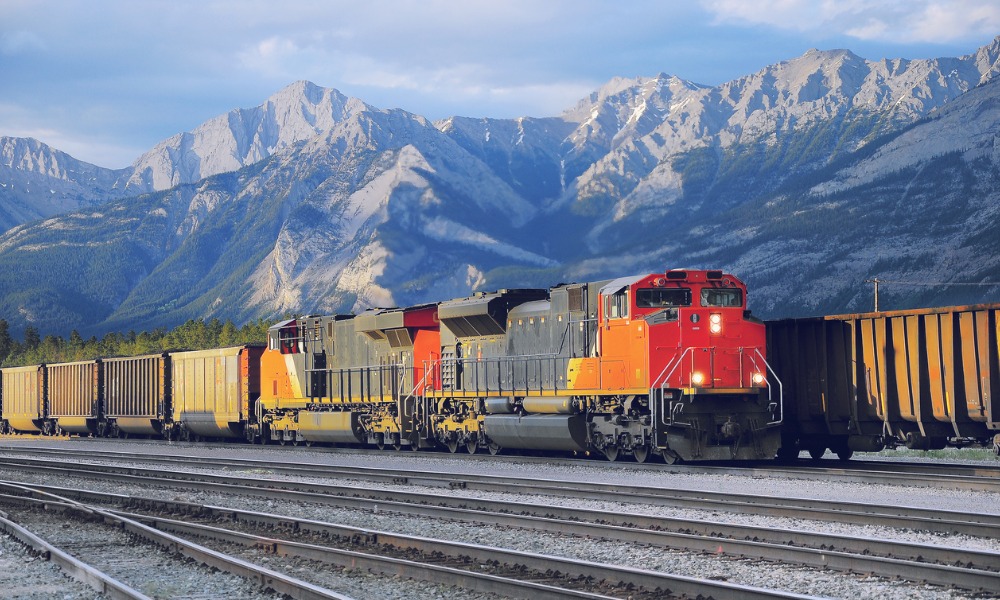Over 9,000 rail workers may strike or face lockouts Thursday, threatening crucial supply chains

As of Thursday, more than 9,000 workers at Canada’s two major railways could either be on strike or locked out, potentially disrupting critical supply chains across various industries, as reported by Financial Post.
The Teamsters Canada Rail Conference, which represents thousands of workers at Canadian Pacific Kansas City Ltd. (CPKC), has issued a 72-hour strike notice to the railway. If no agreement is reached, workers will stop work at 12:01 am Eastern time on Thursday.
In response, Canadian National Railway Co. (CN) announced its intention to lock out workers at the same time unless they reach an agreement or agree to binding arbitration. CN highlighted that, despite weekend labour negotiations, there has been no significant progress.
CN warned that if an immediate resolution is not found, it will proceed with a phased and progressive shutdown of its network, leading to a full lockout. Both CPKC and CN have already begun halting shipments in anticipation of potential work stoppages by a combined 9,300 workers.
CN, for instance, has started blocking container imports from US partner railways. Additionally, both companies have ceased shipping goods requiring cooler temperatures, such as meat and medicine.
Industry groups have expressed growing concern over the possible effects of a work stoppage. The Canadian Federation for Independent Business (CFIB) warned that a shutdown of both railways could “paralyze the economy.”
Jasmin Guenette, CFIB's vice-president of national affairs, stated that disruptions to railway operations could severely impact small businesses, employees, and communities.
Many small businesses depend on rail services to send and receive essential goods and materials, and prolonged work stoppages could lead to lost sales and contracts if deliveries are delayed.
Federal Labour Minister Steven MacKinnon, on Thursday, rejected CN's request for binding arbitration, urging the company to continue bargaining in good faith.
The union responded to CN’s lockout notice by accusing the company of being willing to jeopardize the Canadian economy and hold supply chains hostage to enhance their financial position.
CPKC reiterated its commitment to bargaining in good faith and offered to resolve the dispute through binding arbitration.
The company emphasized that it is moving as much freight as possible before a potential work stoppage while preparing for a safe and orderly shutdown of railway operations in Canada.
Earlier, CPKC served the union with a lockout notice effective at 12:01 am on Thursday. The union asserted that it issued the strike notice to protect its workers, accusing CPKC of stripping essential protections by unilaterally locking out members and altering the terms of collective agreements.
Paul Boucher, the union president, said the decision was not made lightly but was necessary due to CPKC's actions.
CPKC spokesperson Patrick Waldron rejected the union’s claims, calling them a “gross misrepresentation of the truth.” He clarified that the company is only negotiating a status quo agreement at this time.
CPKC's proposed contract renewal includes competitive wage increases consistent with recent agreements with other railway unions and complies with new regulatory requirements for worker rest.
For rail traffic controllers, the company has proposed a renewed agreement that would also include competitive wage increases.
On Sunday, about 10 hours before the union announced its strike notice, Labour Minister MacKinnon posted on X that negotiations between the rail companies and the union were ongoing with the involvement of federal mediators.
CPKC & CN continue to negotiate with Teamsters in Calgary and Montréal alongside federal mediators.
— Steven MacKinnon (@stevenmackinnon) August 18, 2024
I urge the parties to fulfill their responsibility to Canadians and reach agreements at the bargaining table. Workers, farmers, businesses and all Canadians are counting on them.
Canada’s railways transport over $1bn worth of goods daily, with more than half of the country’s exports relying on rail, according to the Railway Association of Canada.



